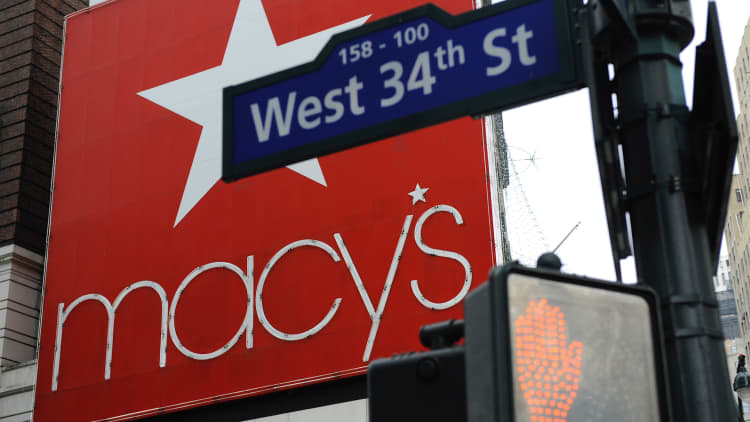Most retail stocks rallied the day after Christmas, on the heels of early sales data that showed the industry is on track to have its best holiday shopping season in six years. But not all retailers have a reason to celebrate, and J.C. Penney is one of those with a bleaker outlook.
The day after Christmas, Penney shares dipped below $1 — hitting 99 cents — for the first time ever. After struggling to stay above $1 for most of Thursday morning, the stock tumbled to a fresh low of 97 cents, bringing Penney's market cap to roughly $310 million. Shares have lost more than a quarter of their value since Penney reported disappointing third-quarter earnings last month and are down more than 68 percent from a year ago.
While many retailers are heading into 2019 on a high note — including some of Penney's department store chain peers — Penney is still struggling to turn things around. The company lost its CEO, Marvin Ellison, to Lowe's in July. It didn't name a replacement until October — the former Joann Stores chief, Jill Soltau.
One of Penney's biggest challenges has been dealing with a pile-up of unsold inventory. While other retailers, including Macy's and Kohl's, have made improvements in managing their merchandise in 2018 and are expected to head into the new year on a good footing, Penney still has work to do. Having a backlog of inventory means more pressure on profits, as the company will be forced to slash prices to clear shelves.
The company also has struggled to sell trend-right apparel, at a time when the apparel industry as a whole is going through somewhat of a renaissance with clothing sales climbing again.
"I would say [Penney] definitely wasn't a winner this holiday season," Retail Metrics founder Ken Perkins told CNBC. "People think of J.C. Penney and unfortunately they don't think of anything trendy. ... They've had an image problem for some time."
Perkins said most of the Penney stores he visited over the past few weeks weren't nearly as busy as a retailer such as Marshalls, where there would be upwards of 75 people in line to buy something. Instead, he said, Penney's home departments — a category where the company has been trying to invest — looked empty of shoppers. "I think they struggled across the board," he said.
Penney has, meanwhile, argued it will benefit from Sears filing for bankruptcy and shutting stores in malls. But Perkins said he thinks former Sears shoppers instead are turning to Kohl's and off-price chains such as Burlington. With more than 860 stores open across the U.S. today, Penney will likely need to shut more locations to focus on a "core group" of assets before things get better, Perkins added.
With low unemployment in the U.S. coupled with high consumer confidence, many analysts agree the backdrop couldn't be better for retailers as 2018 comes to an end. But what does that mean for Penney, still scrambling to grow same-store sales?
"The biggest issue for [Penney] is this is as good as it gets," Stacey Widlitz, president of consulting group SW Retail Advisors, told CNBC. "Gas prices are low. ... You have all the tailwinds in the world," and the company is still struggling, she said. "The older generation is finding less value at J.C. Penney over the years."
On a recent call with analysts, Soltau pointed to women's apparel, activewear, special sizes and fine jewelry as being key growth categories for Penney in the future. But the company will surely be met with heightened competition from the likes of Target, Lululemon and TJ Maxx along the way. Even Nike, a brand that sells items within Penney stores, is increasingly taking the route of selling directly to consumers and is investing in its own standalone shops.
A spokesperson for Penney didn't immediately respond to CNBC's request for comment on this story.
When shares traded on the New York Stock Exchange — like Penney's — close below $1 for 30 consecutive trading days, then the exchange has the ability to initiate a delisting process, according to its website.



